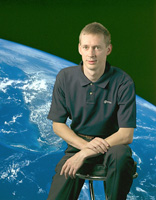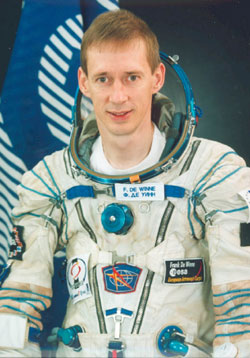RSC
Energia bio
(Apr 09) |
 Frank
DE WINNE Frank
DE WINNE
ISS-20 Flight Engineer,
ISS-21 Commander,
Soyuz TMA TSC Flight Engineer,
ESA Astronaut, Belgium,
Lieutenant-Colonel of the Belgian Air Force
DATE AND PLACE OF BIRTH: April 25, 1961, Ghent (Belgium).
EDUCATION: Frank De Winne graduated from the Royal School of Cadets
in 1979.
He received a Masters degree in telecommunications and civil engineering
from the Royal Military Academy, Brussels, in 1984.
In 1992, he graduated with honours diploma from the Empire Test Pilots
School, England, where he was awarded the McKenna Trophy.
FAMILY STATUS: married.
Wife: Hilde Delange, born in 1962.
Son: Tom De Winne, born in 1987.
Daughter: Nelle De Winne, born in 1989.
Son: Kun De Winne, born in 1994.
AWARDS AND RANKS: First non-American pilot who received the Joe Bill
Dryden Semper Viper Award, in 1997, for demonstration of exceptional skills
during a flight (1997); the Dutch Queen honour for shown leadership during
Allied Force operations (1999).
On December 23, 2002 by Decree of Belgian King Albert II a title of
viscount was conferred on him.
He is a bearer of the Medal of Friendship (Decree of the President
of the Russian Federation, dated May 27, 2003).
In 2003 Frank De Winne received an honorary doctorate from the University
of Limburg.
HOBBIES: Football, computers, gastronomy.
WORK EXPERIENCE: From 1986 to 1992 Frank de Winne was a pilot on Mirage
V aircraft, took part in the development of the Mirage V aircraft upgrading
program.
From December 1992 to 1995 he worked in the Test and Evaluation branch
of the Belgian Air Force. As a test pilot, he was engaged in the CARAPACE
program (an electronic warfare program) at Eglin Air Force Base, USA, and
a Self-Protection Program for the C-130 aircraft.
From January 1994 to April 1995, Frank De Winne was responsible for
the flight safety program of the 1st Fighter Wing at Beauvechain, Belgium.
From April 1995 to June 1996, as a senior test pilot in the European
Participating Air Forces (EPAF), he was detached to Edwards Air Force Base,
California, USA, where he participated in the aircraft upgrading program,
focussing on radar testing.
From 1996 to August 1998 he was a senior test pilot in the Belgian
Air Force, responsible for all test programs and pilot-vehicle interfaces
for the advanced flight vehicles.
From August 1998 to January 2002, Frank De Winne was the Commander
of the 349th Squadron at Kleine Brogel Airbase, Belgium. Frank De Winne
has logged more than 2300 hours on aircraft of different types, among which
are: F-16, Tornado, Jaguar, Mirage.
In January 2000 he was selected as an astronaut by the European Space
Agency and joined the European Astronaut Corps.
Since August 2001 he passed training at Yu.A. Gagarin CTC.
Since December 10, 2001 he began to train for a space flight directly
as a flight engineer of the prime crew of the Soyuz TM, Soyuz TMA transport
spacecraft for Expedition 4 (VC-4) under the ISS program, together with
Sergei Zaletin, crew commander, and from October 1, 2002 with Yuri Lonchakov
as well.
He performed his first space flight from October 30 to November 10,
2002 as flight engineer-2 for Expedition 4 (VC-4) under the ISS program.
The flight duration was 10 days 20 hours 52 min.
In August 2006 by the joint decision of Roscosmos and NASA he was preliminarily
assigned to the ISS-16 backup crew as the ESA astronaut. On February 13,
2007 his assignment was confirmed by NASA.
In August 2007 he was preliminarily assigned to the prime crew of Expedition
20 to the ISS (ISS-20). On February 12, 2008 NASA officially declared on
his assignment to this crew. In July 2008 a decision about his assignment
as the ISS-21 Expedition commander was adopted. On November 21, 2008 his
assignment was officially confirmed by NASA when declaring the ISS-20 -
ISS-26 crewmembers.
April 2009
By the data submitted by Yu.A. Gagarin CTC,
European Space Agency, site www.astronaut.ru |
|



 Frank
DE WINNE
Frank
DE WINNE
 Frank
DE WINNE
Frank
DE WINNE